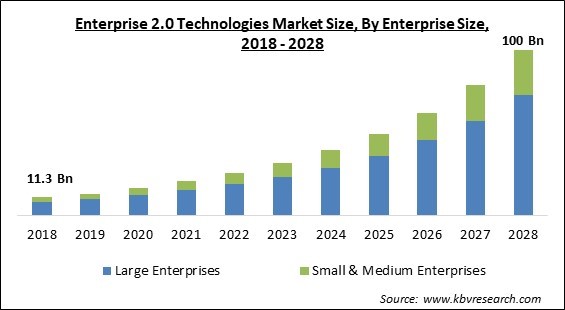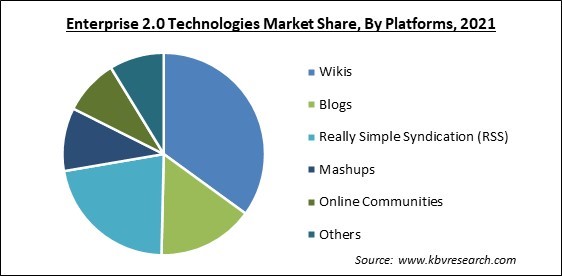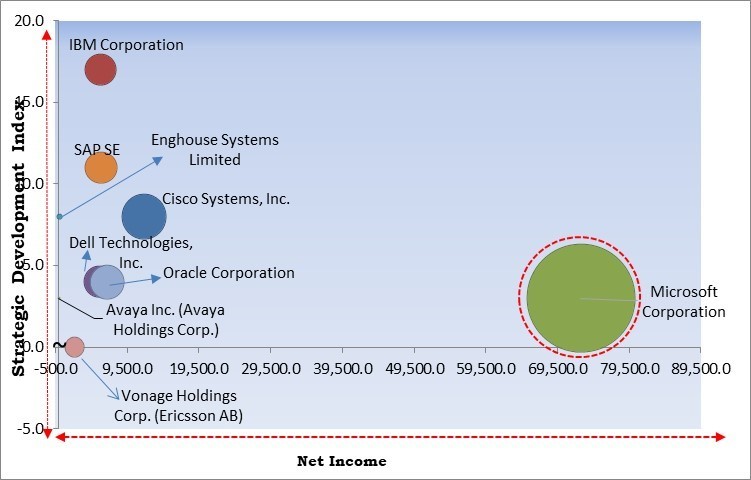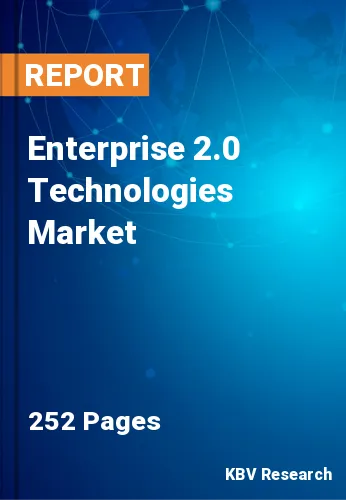The Global Enterprise 2.0 Technologies Market size is expected to reach $100 billion by 2028, rising at a market growth of 25.4% CAGR during the forecast period.
Enterprise 2.0 is moving web 2.0 technologies and tools into the enterprise to assist employees, suppliers, partners, and customers in building a network of like-minded individuals and sharing information. Enterprise 2.0 takes the original concept of the web, utilizing the web to feed content to visitors. Enterprise 2.0 technologies are the environment in web settings that are used to boost the business-decision making and business communication.

Enterprise 2.0 technology are used to streamline processes that aid larger companies in attaining their goals. Enterprise 2.0 implementations usually utilize a combination of social software and collaborative technologies like blogs, social bookmarking, wikis, and social networking. AI in enterprise 2.0 leverages sophisticated packaged solutions and technologies platforms that simplify, streamline, and speed up AI-driven innovation.
Moreover, cloud computing assists web 2.0 applications by allowing them to demand access to a shared pool of computing resourcing. It comprises a network and social modifications to corporate intranets and other classic software platforms utilized by large companies to organize their communication. In contrast to traditional enterprise software, which imposes structure before usage, enterprise social software tends to encourage use before providing structure.
Enterprise 2.0 has a tremendous potential impact from a revenue and organizational perspective in the customer-facing fields. Thus, it is making organizations agile in their customer relations. New-gen technologies offer new ways of engaging and contacting new customers in two ways. An enterprise can get ideas for product enhancements and launch new products for consumers.
Customers’ ideas will likely be much more successful than in-house research-based ideas. Also, they make organizations more trustworthy and transparent to consumers while aiding in consumer satisfaction and support. For instance, many companies now have online assistance services and product discussions on their websites. A user’s query can be solved instantly.
Many industries globally have been impacted negatively since the start of the pandemic. This was majorly due to the lockdowns applied by the government of many nations, which disrupted the supply chain and manufacturing operations of many sectors. Similarly, the enterprise 2.0 technologies market was also affected. Also, consumer demand decreased as many started to cut the non-essential items from their budgets as the general economic status of many people has been greatly hampered. These factors are expected to burden the market's revenue in the projected period.
Companies are introducing AI enterprise 2.1, the latest update of the enterprise 2.0 technology, the vendor’s cloud-native suite, which enables the enterprise to operate AI systems and tools on the VMware vSphere platforms. Furthermore, enterprise 2.0 supports every central cloud platform and data center, including bare-metal servers, virtualized infrastructure, and CPU- only systems. The constant betterment of the enterprise 2.0 technologies with new updates, combined with its other benefits, is expected to propel the enterprise 2.0 technologies market.
A business marketer can utilize various trending social media platforms like Twitter and LinkedIn. These platforms offer businesses an ideal environment to retain and attain customers while also aiding them to study customer behavior more precisely because these platforms directly deal with the customers. Thus, the increasing penetration of the internet and smartphones, which allows a more accessible collaboration between the business and the customer, is expected to boost the enterprise 2.0 technologies market growth.
The lifestyle brought by the Web 2.0 in enterprises has blurred the lines between private and professional life, and due to this psychological shift, many individuals may share information that may be sensitive. Also, the accumulation of sharing small non-sensitive can allow business competitors to gain intelligence about the company and utilize it against businesses. With the increased usage of web 2.0 technologies comes the risk and various application-based vulnerabilities. The security issues with web 2.0 will decrease the adoption of enterprise 2.0 technologies and hinder the growth of the market.
Based on platform, the enterprise 2.0 technologies market is segmented into wikis, blogs, really simple syndication (RSS), mashups, online communities and others. The blogs segment procured a promising growth rate in the enterprise 2.0 technologies market in 2021. This is due to the usage of blogs to provide news or commentary on a specific subject. Blogs can also be utilized as a personal diary and allow readers to leave comments in an interactive format. Blogs help organizations to create a simple web presence while informally sharing ideas and getting feedback.
On the basis of enterprise size, the enterprise 2.0 technologies market is divided into large enterprises and SMEs. The SMEs segment garnered a prominent revenue share in the enterprise 2.0 technologies market in 2021. This is due to using enterprise 2.0 technologies to smoothen business processes while connecting people through social media tools. These technologies are utilized to enhance productivity and efficiency between customers, companies, suppliers, and partners. Also, they aid in surging both customer satisfaction and revenue.
By vertical, the enterprise 2.0 technologies market is classified into IT & telecom, BFSI, manufacturing, healthcare and others. The IT & telecom segment registered the highest revenue share in the enterprise 2.0 technologies market in 2021. The growth is because they provide a more comprehensive range of automated services and enhance customers' service strategy. IT & telecom companies are digitalizing their business operation to attain transparency to business operations and speed up their product development process.

| Report Attribute | Details |
|---|---|
| Market size value in 2021 | USD 20.9 Billion |
| Market size forecast in 2028 | USD 100 Billion |
| Base Year | 2021 |
| Historical Period | 2018 to 2020 |
| Forecast Period | 2022 to 2028 |
| Revenue Growth Rate | CAGR of 25.4% from 2022 to 2028 |
| Number of Pages | 252 |
| Number of Tables | 393 |
| Report coverage | Market Trends, Revenue Estimation and Forecast, Segmentation Analysis, Regional and Country Breakdown, Competitive Landscape, Companies Strategic Developments, Company Profiling |
| Segments covered | Platforms, Enterprise Size, Vertical, Region |
| Country scope | US, Canada, Mexico, Germany, UK, France, Russia, Spain, Italy, China, Japan, India, South Korea, Singapore, Malaysia, Brazil, Argentina, UAE, Saudi Arabia, South Africa, Nigeria |
| Growth Drivers |
|
| Restraints |
|
Region-wise, the enterprise 2.0 technologies market is analyzed across North America, Europe, Asia Pacific, and LAMEA. The North America region led the enterprise 2.0 technologies market by generating the maximum revenue share in 2021. This is due to the rising adoption of big data and other analytics technology to increase production and enhance market share. Also, the rising penetration of IoT technologies across different industries, assisted by the availability of high-speed broadband connectivity, is a significant cause enabling communication between multiple devices. Hence, the presence of many vital players, joined with the rapid adoption of cloud-based services, is expected to surge the market growth in the region.
Free Valuable Insights: Global Enterprise 2.0 Technologies Market size to reach USD 100 Billion by 2028

The major strategies followed by the market participants is Partnership. Based on the Analysis presented in the Cardinal matrix; Microsoft Corporation is the forerunner in the Enterprise 2.0 Technologies Market. Companies such as Cisco Systems, Inc., Oracle Corporation, Dell Technologies, Inc. are some of the key innovators in Enterprise 2.0 Technologies Market.
The market research report covers the analysis of key stake holders of the market. Key companies profiled in the report include IBM Corporation, SAP SE, Oracle Corporation, Dell Technologies, Inc., Cisco Systems, Inc., Microsoft Corporation, Avaya Inc. (Avaya Holdings Corp.), Enghouse Systems Limited (Dialogic Corporation), Vonage Holdings Corp. (Ericsson AB), and CafeX Communications, Inc.
By Vertical
By Enterprise Size
By Platforms
By Geography
The global Enterprise 2.0 Technologies Market size is expected to reach $100 billion by 2028.
Rising awareness towards the benefits of enterprise 2.0 are driving the market in coming years, however, Security risk on networks restraints the growth of the market.
IBM Corporation, SAP SE, Oracle Corporation, Dell Technologies, Inc., Cisco Systems, Inc., Microsoft Corporation, Avaya Inc. (Avaya Holdings Corp.), Enghouse Systems Limited (Dialogic Corporation), Vonage Holdings Corp. (Ericsson AB), and CafeX Communications, Inc.
The Large Enterprises segment is leading the Global Enterprise 2.0 Technologies Market by Enterprise Size in 2021 thereby, achieving a market value of $72.8 billion by 2028.
The North America market dominated the Global Enterprise 2.0 Technologies Market by Region in 2021, and would continue to be a dominant market till 2028; thereby, achieving a market value of $38.8 billion by 2028.
Our team of dedicated experts can provide you with attractive expansion opportunities for your business.

